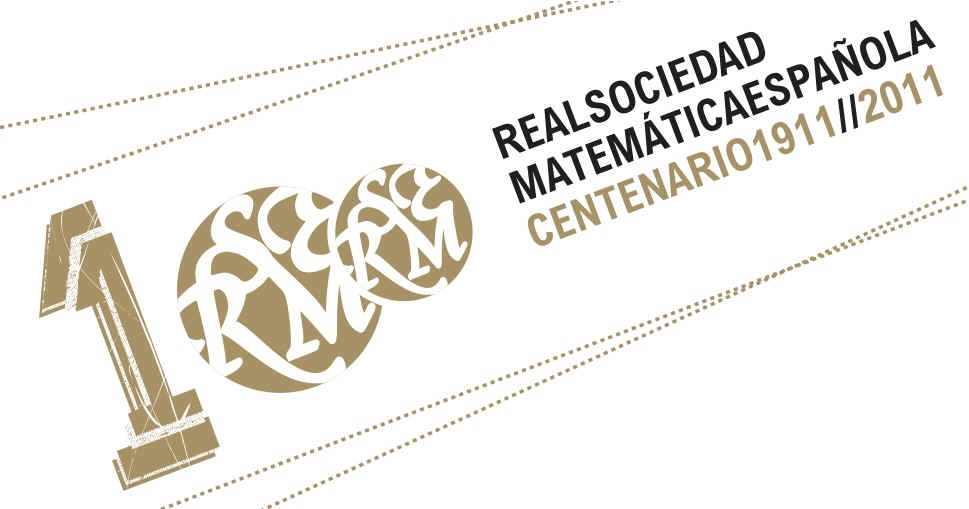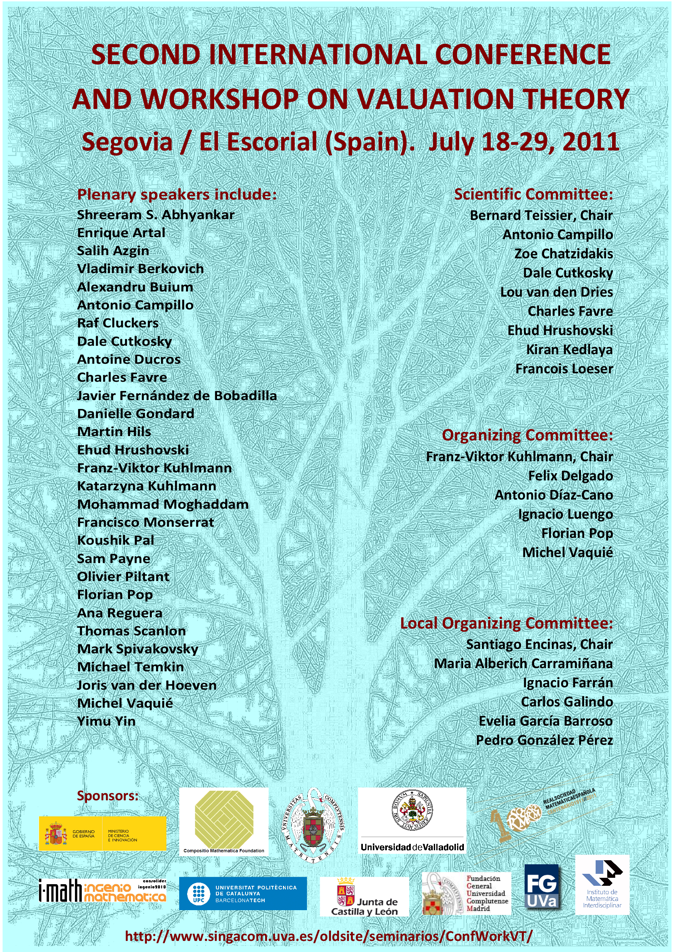Scientific content and intention of the conference
The conference is intended to cover some of the recent developments in valuation
theory and its applications. Valuation theory developed in the
first half of this century as a part of algebraic number theory, the theory of
ordered fields and the theory of ordered abelian groups. Then,
through the work of Zariski and Abhyankar, it witnessed important applications
in algebraic geometry. Later, as the tools of algebraic geometry
shifted away from valuation theory, and algebraic number theory did not provide
any new valuation theoretical questions, research in valuation theory
became less frequent. However, mathematicians from real algebra and from model
theory kept an interest in valuation theory, and there was a
remarkable, but somewhat clandestine development of the subject.
In recent years, valuation theory has found its way back into algebraic geometry and
has witnessed many important applications in various branches of mathematics.
It is fascinating to see how fundamental principles of valuation theory
are discovered to play a role in various topics which seem to be only loosely
related.
In particular, valuation theory has been discovered to
be extremely useful in the theory of complex dynamical systems, and in the study
of non-oscillating trajectories of real analytic vector fields in
three dimensions. Analogues of the Riemann-Zariski valuation spaces have
been found to be the proper framework for questions of intersection theory
in algebraic geometry.
In a different direction, the relation between
Berkovich geometry, tropical geometry and valuations spaces, on the one
hand, and the geometry of arc spaces and valuation spaces, on the other, have
begun to deepen and clarify.
The well established topic of the
model theory of valued fields is also being transformed, in particular through
the study of valued fields with operators. Simultaneously, the work
on the "classical" aspects of the subject has increased and substantial
progress has been made toward the solution of the local uniformization
problem in arbitrary characteristic, the study of ramification of valuations
in arbitrary dimension, in particular the nature and role of the
mysterious "defect".
All this corresponds to new insights and new approaches to old problems.
This is why right now is a perfect time to hold a
conference onthe newly growing and flourishing subject of valuation theory.
The organizers of the conference have chosen to privilege the
topics listed above among a great diversity of topics where valuation
theory plays a role, but some of those other topics will be represented as well,
and some contributed lectures will be accepted. The intended audience includes
graduate students and researchers in all aspects of this subject. The
conference is intended to bring together the experts of several branches
of valuation theory and of related topics in order to strengthen the
relations between these branches. At the same time it shall introduce
non-experts to the principles and results of valuation theory, in particular if
they are coming from areas of mathematics in which valuation theory has recently
witnessed important contributions (e.g., algebraic geometry, Galois
theory, asymptotic analysis, dynamical systems) or in which the role of
valuation theory still has to be determined (e.g., C*-algebras). One main
goal of our conference is to point out and study the relations between
different branches of valuation theory, and their applications to other
branches of mathematics. Another main goal is to state and discuss the many
important open problems in valuation theory in order to provide an
optimal basis for future research conducted by experts and students.
In particular, valuation theory has been discovered to be extremely useful in the theory of complex dynamical systems, and in the study of non-oscillating trajectories of real analytic vector fields in three dimensions. Analogues of the Riemann-Zariski valuation spaces have been found to be the proper framework for questions of intersection theory in algebraic geometry.
In a different direction, the relation between Berkovich geometry, tropical geometry and valuations spaces, on the one hand, and the geometry of arc spaces and valuation spaces, on the other, have begun to deepen and clarify.
The well established topic of the model theory of valued fields is also being transformed, in particular through the study of valued fields with operators. Simultaneously, the work on the "classical" aspects of the subject has increased and substantial progress has been made toward the solution of the local uniformization problem in arbitrary characteristic, the study of ramification of valuations in arbitrary dimension, in particular the nature and role of the mysterious "defect". All this corresponds to new insights and new approaches to old problems. This is why right now is a perfect time to hold a conference onthe newly growing and flourishing subject of valuation theory.
The organizers of the conference have chosen to privilege the topics listed above among a great diversity of topics where valuation theory plays a role, but some of those other topics will be represented as well, and some contributed lectures will be accepted. The intended audience includes graduate students and researchers in all aspects of this subject. The conference is intended to bring together the experts of several branches of valuation theory and of related topics in order to strengthen the relations between these branches. At the same time it shall introduce non-experts to the principles and results of valuation theory, in particular if they are coming from areas of mathematics in which valuation theory has recently witnessed important contributions (e.g., algebraic geometry, Galois theory, asymptotic analysis, dynamical systems) or in which the role of valuation theory still has to be determined (e.g., C*-algebras). One main goal of our conference is to point out and study the relations between different branches of valuation theory, and their applications to other branches of mathematics. Another main goal is to state and discuss the many important open problems in valuation theory in order to provide an optimal basis for future research conducted by experts and students.

